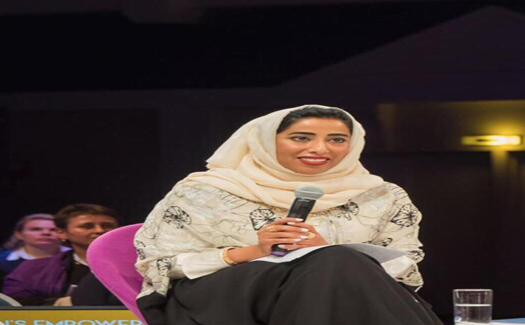ID :
345011
Sun, 10/19/2014 - 09:55
Auther :
Shortlink :
https://oananews.org//node/345011
The shortlink copeid
U.A.E. leadership’s support to women empower them to contribute in building their country's future

Abu Dhabi (WAM): The U.A.E. leadership s support, guidance and determination to engage Emirati women as active members of the community are among the main drivers enabling women to work shoulder-to-shoulder with the men and have their fair share in building the future of their country, said Chairperson of the Board of Directors of Dubai Women Establishment, DWE.
"President His Highness Sheikh Khalifa bin Zayed Al Nahyan and Vice President and Prime Minister of U.A.E. and Ruler of Dubai His Highness Sheikh Mohammed bin Rashid Al Maktoum, put women empowerment among the government s top priorities," said Mona Ghanem Al Marri who led the U.A.E. delegation to the 10th edition of the Women's Forum Global Meeting in Deauville, France. She was speaking during the forum at a panel discussion titled 'Women s empowerment: Bearing Witness to the Changes.' Stressing that the constitution of U.A.E. considers woman a major player in national development, and that Emirati woman has successfully presented a model in shouldering responsibilities in various walks of life, the official said Emirati women occupy 66% of public sector positions, out of which 30% are in effective leadership and decision-taking.
U.A.E. leaders’ invaluable support and continuous encouragement to women, she further stressed, stem from a solid belief that women are capable not only to excel but also to surpass expectations once they are given the right tools to unleash their potentials.
Women managed to prove themselves very well in vital fields such as education, business, public service, and entrepreneurship benefiting from political stability, social peace and equal rights granted by the U.A.E. constitution.
"Emirati women succeeded in occupying high ranking government positions as ministers, members of parliament and ambassadors, she said underling the importance of education as a fundamental pillar for women empowerment. She said U.A.E., since its establishment only 43 years ago, has considered education a key element in the country s formula of success.
Highlighting the results of the Global Gender Gap Report issued by the World Economic Forum, benchmarking national gender gaps of 133 countries on economic, political, education and healthcare, she said the report ranked U.A.E. first in the MENA region in terms of closing the gender gap in education, wage equality, political rights and healthcare.
The Arab World, she noted, needs more role models to inspire and educate the community about woman s important role in the society and her right to obtain the necessary tools to fulfil that role, most importantly education, and the head of DWE explained. "We need more examples like Malala Yousafzai, the Pakistani activist for female education and the youngest-ever Nobel Prize recipient.
Answering a question by session moderator Su Mei Thompson, CEO of The Women s Foundation, Hong Kong, about legislative and legal reform and its impact on women s rights in the Middle East, the U.A.E. official said that from a legislative perspective, progress in women's empowerment varies from one country to another based on the concerned country s unique circumstances and the level of awareness about the weight of women s contributions to the society.
Al Marri explained that some countries are leaps ahead in introducing initiatives to encourage women to play a part in all areas of society while other political structures have been slow to change. It is also important to mention that unrest still hinders woman empowerment in some countries in the region she clarified.
Commenting on the crucial impact of social media on empowering woman, she said that traditional and social media are able to enhance cultural and social awareness about women s issues, changing the stereo type image of women in the Arab world. She said media awareness campaigns can positively impact trends of regulatory reforms in the region.
Answering a question on women s share of the Arab World’s entrepreneurial landscape, Al Marri asserted that also opportunities and challenges differ from one country to another. According to recent studies, Arab women are relatively lagging behind in entrepreneurship.
Lack of confidence, appropriate funding and knowledge to start their own enterprise, might be among the key challenges that face women entrepreneurs in the Middle East and North Africa, MENA, she said quoting findings of recent researches.
Touching on the progress of women entrepreneurs in U.A.E., she said women benefited from the country's encouraging economic environment and ongoing government support which enabled female entrepreneurs to shine. She added that even though the experience of women entrepreneurs is in its early stages, the indicators are very promising and expectations are high.
Al Marri also commended the impact of Dubai Women Establishment as instrumental in empowering women through a busy agenda rich with workshops, conferences and other events organised in collaboration with local, regional and international organisations sharing the same interest. – Emirates News Agency, WAM –
http://www.wam.ae/en/news/emirates/1395271036981.html





